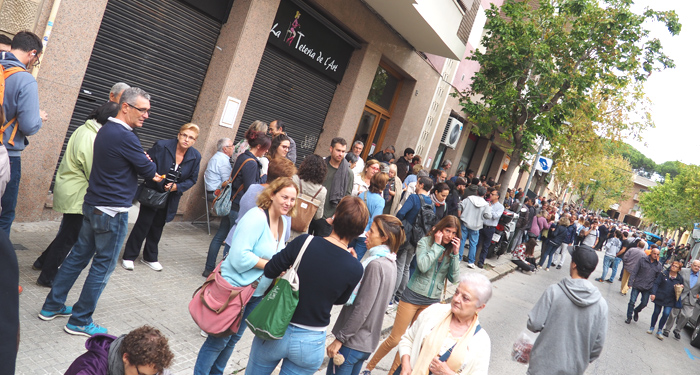News
Catalan president suggests Parliament should issue independence declaration, demands international mediation
90% ballots cast in self-determination referendum are for independence, turnout 42.6% · Police violence leaves 893 injured
One hour before the voting started, the government announced anyone could vote in any polling station in an effort to partially overcome that problem, but it is unclear to what extent the news came to the knowledge of voters affected.
 Line of voters in Sant Feliu de Llobregat / Photo: David Forniès
Line of voters in Sant Feliu de Llobregat / Photo: David FornièsTwo hours before the referendum was over, Catalan president Carles Puigdemont in an official statement said “millions of people facing all sorts of difficulties and threats took to the streets, they spoke loud and clear and addressed a message to the world: We have the right to decide our own future, the right to freedom and we want to live peacefully, without violence and outside a state that is not capable of offering any convincing reason other than the use of brute force.”
“For this reason,” Puigdemont went on, “the citizens of Catalonia have won the right to have an independent state to be established in the form of a republic.” That was the exact wording of the question in the referendum ballots. “Consequently,” Puigdemont announced, “the government that I preside over will present today’s results to the Parliament of Catalonia, where the sovereignty of our people resides, so it can proceed in accordance with the Referendum law.”
According to the Referendum law, the Catalan Parliament shall issue a formal declaration of independence within two days of the proclamation of the results by the Electoral Commission, if “yes” votes prevail.
Puigdemont, speaking again Monday morning, has asked for the establishment of an international mediation —and has called on the Spanish government to accept it— in order to “recover institutional normality.”
Vote marred by police violence
The largest trouble by far in yesterday’s voting was Spanish police violence, which left 893 injured, according to data from the Catalan ministry of Health. Spain’s National Police and the Guardia Civil (Spanish military police) were seeking to prevent the referendum from being held after the TSJC (the highest body of the Spanish judiciary in Catalonia) had ordered them not to allow the vote. The referendum was considered illegal by the Spanish government. Out of 2,231 polling stations, the Catalan authorities said 400 had been closed down by the Spanish police.
Both the National Police and the Guardia Civil have come under heavy criticism from political parties, rights groups, trade unions and international observers alike, as their use of force against voters has been deemed as absolutely disproportionate and thus contrary to law. At least two people were severely injured, one of them after having been hit by a rubber bullet.
Rights group Iridia member and lawyer Anaïs Franquesa told Crític news site yesterday that her organization has received reports of “extreme violence” by the police, including “sexual assault” against women.
A group of international observers led by Dutch diplomat Daan Everts yesterday said that police violence had been “deplorable”.
Spanish government ignores injured people
Neither Spanish deputy president Soraya Sáenz de Santamaría nor Spanish president Mariano Rajoy pronounced not even one single word of relief for those injured, and instead blamed the Catalan government for all the wrongs over the day. Rajoy furthermore said the vote was not a true referendum but an unlawful sham, argued that the police forces just complied with judicial orders, and welcomed the fact that Spain had showed itself as a “mature, advanced democracy”.
Leader of opposition Pedro Sánchez (PSOE) deplored at the end of the day the use of violence, but still held the Catalan government “irresponsible in the first place” for having launched the course towards the independence referendum.
Spanish nationalist Citizens’ Party (C’s) leader Albert Rivera has asked Rajoy to trigger article 155 of the Spanish Constitution, which allows the Spanish government to “take all measures necessary to compel” an autonomous community —Catalonia in this case— to “meet […] obligations imposed upon it by the Constitution or other laws”. Rivera believes the government should force a snap election in Catalonia before the Catalan Parliament issues the declaration of independence.
